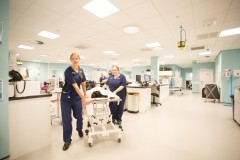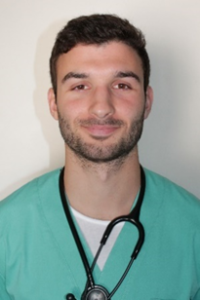Rodrigo tells us why his hands-on experience in Vets Now internship is the right start for his surgical career
Our internships are a valuable opportunity for qualified veterinary surgeons to gain knowledge and experience in our Glasgow and Manchester hospitals.
Rodrigo Paulino is a current surgical intern in Manchester, following attaining his qualifications at home in Portugal and spending time as a small animal intern in daytime practice.
In this interview he reflects on what he’s learned in the internship so far and what he would tell prospective interns.

Interested in an internship?
Call our talent team on 01383 841181 to discuss your options or send one of our talent partners an email by clicking here.
Find out moreDid you always want to be a vet?
I did when I was very young, but as I got a bit older, I was focused more on sports. But then when I had to make a decision about my career, I knew I wanted to do something I loved, and I had always been drawn to animals and being a vet seemed interesting. So, I just made the decision to focus on that and went from there.
What brought you to the internship programme?
During uni, I started to become aware that I had a passion for surgery. I went to uni in Lisbon, and it was on an Erasmus externship in Mallorca where I met some specialists for the first time and that opened my eyes a little bit to the possibility that specialisation was an option. Of course, in human medicine you take for granted that you will go to uni and then a residency and specialisation, everything is straightforward. But in Portugal specialisation is not common in veterinary. The specialists I met told me that I couldn’t stay where I was and do what I wanted to do. So I knew I had to move elsewhere to pursue surgery. As I already spoke English, the UK was a natural choice.
What is it that you enjoy about surgery?
I like the responsibility of it. Obviously you work as a team, but it’s your hands in there. I like that kind of accountability. I also like how meticulous the process is, how governed by principles – follow the rules, and it will all work out fine. Of course, the other side of it is that if something goes wrong, I’m also the one responsible for everything.
But in general, I enjoy calling the owners after the surgery, letting them know everything went well. Seeing them come to the hospital, and pick up a dog that was maybe very unwell when he came in and is now better and ready to go home, it’s very rewarding.
How did you find working in first opinion practices?
When I first moved to the UK I initially worked in a first opinion clinic, as most of the internships and rotations required you to have that experience before going into more specialised programmes. I know many people enjoy working in first opinion but it wasn’t for me. Sometimes it felt too repetitive.
And the interactions with owners are different as well. In first opinion, I might talk with thirty owners in one day and it’s really important to build a long-term relationship. Here, it might be three owners a day, and I won’t meet them again so that long-term relationship is not common. I would rather deal more with pets than owners sometimes.
I applied for surgical internships as soon as I could and luckily have been able to move into the specialisation quite quickly.

Do you feel like you’ve been getting a lot out of your internship?
I feel I’ve learned a lot here. When I started I was the only surgical intern, so I got a lot of individual attention and all of the learning opportunities came to me. Which was quite good, as every time there was a less complex surgery, I was able to perform it as the only surgical intern. Of course there is always an adaptation period. The first few months I did only a couple of things, but now that I’ve been here longer I’m doing much more. I can feel myself evolving as a surgeon, whereas in a lot of internships you wouldn’t get the chance to actually cut anything. It’s much more hands off and you’re in a more of a helping capacity. Here, there is a lot of opportunity to take primary responsibility. And then you do also get to see those more complex cases where you are acting as an assistant to a more senior vet.
Have you felt supported in your learning?
Yes, the team is very friendly here. Surgeons have a bit of a reputation for being full of themselves or thinking they are more important than other people, but that’s not the case here; everyone is very approachable. And the advantage of being in the hospital setting is there is a lot of support from the ECC teams as well. Having the pre-op and post-op support decreases the complication rates so it’s great for the patients. And it allows the surgeon to be in the theatre focusing on the surgery at hand, knowing that someone else will be able to attend to the patient afterwards and handle the other cases that are coming in.
What are the next steps for you after the internship?
In July I’ll be starting a residency with Vets Now, so in the next five years or so I’ll be finishing my residency and sitting the ECVS exam, and then just see what the future brings. At the moment I’m very happy with where I am; I like the team and the environment and I’ve really enjoyed living in Manchester as well.
What advice would you give to prospective applicants?
Different internships will have different expectations, and of course interns will expect different things from the internship, so you need to really know what you’re applying for and what you want to get out of it. You’ll have to know how surgeons work and fit well into the team.
And your environment will make a difference. You might prefer a more close-knit team where you have more opportunities to do things hands-on. Or you might prefer a larger multi-disciplinary referral where maybe you won’t get as much practical experience but have more contact with more people and more interesting cases – but you’ll be one intern among many.
The veterinary world is very small, especially referrals. So you can usually find someone who knows someone who had experience in an internship so you can get some inside information. There are lots of internships all over the UK and in Europe, so you can find the right fit but you need to do your own research.
And just try to get as much out of it as possible, because otherwise what’s the point? For surgery especially, it’s very different and very hard, so make sure it’s what you really want to do
